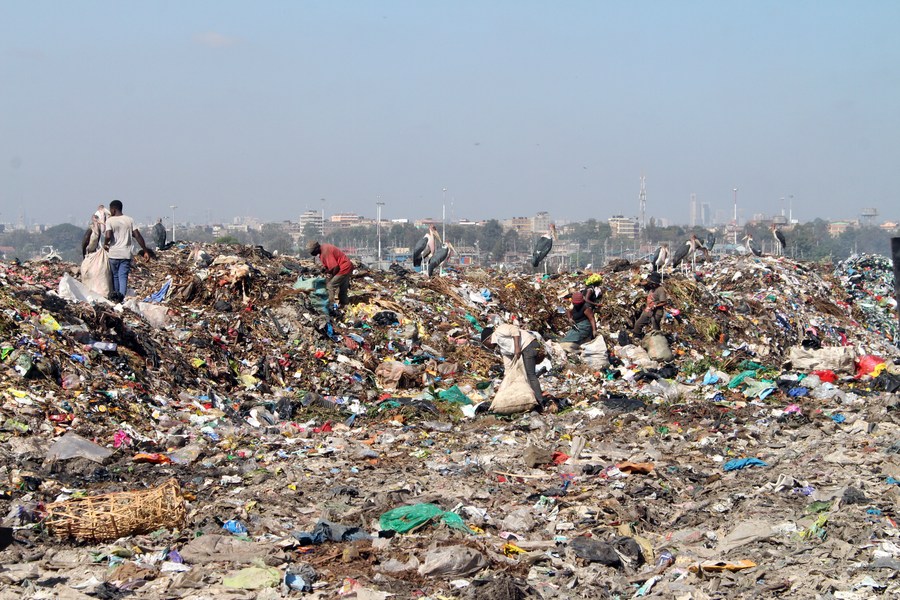
The file photo shows people looking at artwork made of plastic bottles at the United Nations Environment Programme (UNEP) headquarters in Nairobi, the capital of Kenya, on Feb. 27, 2022. (Photo by Joy Nabukewa/Xinhua)
A durable solution to the global plastic pollution crisis is within reach, once governments and industry agree on a radical, dramatic policy shift and adoption of new business models to promote recycling and reuse, according to the United Nations Environment Programme.
NAIROBI, May 17 (Xinhua) -- A durable solution to the global plastic pollution crisis is within reach, once governments and industry agree on a radical, dramatic policy shift and adoption of new business models to promote recycling and reuse, the United Nations Environment Programme (UNEP) said in a report launched Tuesday in the Kenyan capital of Nairobi.
Launched ahead of the second round of negotiations for a global agreement on ending plastic pollution to take place in Paris, France, from May 29 to June 2, the report stresses that leveraging policy and regulatory reforms and incentivizing markets will be key to hastening the transition from linear to the circular economy.
Titled "Turning off the Tap: How the world can end plastic pollution and create a circular economy," the report says the gradual elimination of non-biodegradable packaging material will be a boon to the green economy and human health.
Inger Andersen, UNEP executive director, noted that haphazard production, use and disposal of plastics have escalated pollution of vital ecosystems, to the detriment of public health and global climate change response.
Only an integrated, systemic shift from a linear to a circular economy can keep plastics out of the ecosystems and bodies, said Andersen, adding that a global pact to end plastic pollution will deliver enormous social, economic, and ecological benefits to humanity.

The file photo shows people scavenging for valuable waste at the Dandora dumpsite, in the Kenyan capital of Nairobi, on February 26, 2022. (Photo by Joy Nabukewa/Xinhua)
It will be possible to slash plastic pollution by 80 percent by 2040, once governments and the private sector adopt new policy tools, technologies, and business models, to promote recycling and reuse, says the UNEP report.
According to the report, a dramatic shift to a circular economy would result in 1.27 trillion U.S. dollars in savings, and a further 3.25 trillion dollars would be saved from averted risks such as marine ecosystem degradation, air pollution, human ailments, and litigation-related costs.
The transition from linear to circular economy would lead to a net increase of 700,000 jobs mostly in low-income countries by 2040, transforming the livelihoods of workers in the informal economy, says the report.
Currently, the world produces 430 million metric tons of plastics annually, and two-thirds are short-lived products which soon become waste, only to clog waterways and urban green spaces, notes the report.
The report adds that plastic pollution could triple by 2060 if the status quo persists, warning that the social and environmental toll of plastic pollution could range from 300 billion to 600 billion dollars annually. ■












